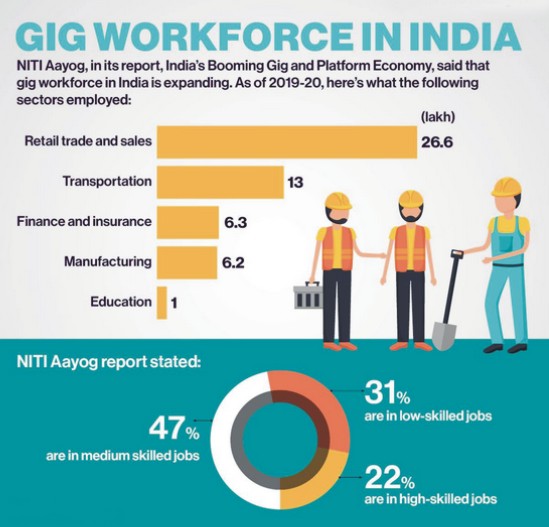

In his budget speech, Rajasthan Chief Minister Ashok Gehlot had announced in February that his government is likely to bring the Platform Based Gig Workers (Registration and Welfare) Bill, 2023.
The Bill envisages a Gig Workers’ Welfare Board that will design welfare policies and also act as a grievance portal for workers who are hired on piece-rate basis. A seed fund of Rs 200 crore was also announced by the chief minister. It is a welcome step and all states should adopt it for their welfare.
 In June 2022, as per the release of NITI Aayog report there were 77 lakh gig workers in 2020-21 and this figure likely to go up to 2.35 crore by 2029-30. An estimated 56% of new employment in India is being generated by the gig economy companies across both the blue-collar and white-collar workforce.
In June 2022, as per the release of NITI Aayog report there were 77 lakh gig workers in 2020-21 and this figure likely to go up to 2.35 crore by 2029-30. An estimated 56% of new employment in India is being generated by the gig economy companies across both the blue-collar and white-collar workforce.
During Karnataka Assembly elections, a Gig Workers’ Welfare Board was promised by the party in its manifesto, while taking a leaf from the Rajasthan Congress government led by Ashok Gehlot. The party manifesto in Karnataka has further raised the bar even higher by promising a 3,000 crore seed fund, making it industry friendly too, since there will be no cost to the business.
According to John Dayal, noted social and human rights activist, “The Rajasthan governments proposed legislation on gig workers carves history in covering a humungous group of labour that was till now invisible as much as it was ubiquitous. These were not just the drivers of Uber and Ola Taxis or other transport aggregators which now exist for transporting goods, moving household baggage for people changing cities on employment or transfers.

He added, “But the largest groups of people who now get a legal identity are those employed bringing food from restaurants and fast food joints, Amazon and other mail order goods, books and other commodities to your doorstep. They do so in a guaranteed short while, ranging from as little as thirty minutes for a pizza to a day for Amazon prime. While the transport chain can be long and involve shipping, train and even aircraft, the last mile delivery is by a young man or woman on a motorcycle or scooty who brings it to your home. More often than not, we don’t tip them even a small amount in recognition or gratefulness.”
“Till the advent of the smart phone, the only person doing a doorstep delivery was the postman or the milkman.The Covid pandemic brought home the fact how an integral part of our urban living the gig workers had become, more so, for those working from home, single parents and other professionals. And yet, as a non-unionized, casually employed person, the gig workers had no rights. They could be sacked on the spot; their payments could be withheld, apart from the harassment they faced from customers. Sometimes they were assaulted” said Dayal.
On the implementation, Dayal said, “It remains to be seen how the law, when it comes into force, will be implemented. The gig worker remains a solitary person with a one on one relationship with the employer. The smaller the town, the more vulnerable is the gig worker. Indian employers are also notorious for finding short cuts, and extra-legal ways to circumvent the law. It also remains to be seen in how soon labour departments and grievance redressal systems will be brought up to date, to protect the gig worker. One would like to hope that the government is serious in its intent, and the workers will get some relief.”
Professor Salim Engineer who is serving as a professor in the Department of Electronics & Communication Engineering at MNIT (Rajasthan) said, “The effort of Rajasthan government for the sake of gig workers is appreciable. The government is also bringing some good schemes on education and health. It is laudable that the Rajasthan government is working for the welfare of gig workers and fund of Rs 200 crore has been announced for them by the government. In a welfare state rights of the labour/ worker should be addressed and it should be done in the entire country.”

“All states should think in that direction not only for the gig workers but for all who are working in the unorganized sectors because the cost of education and health is continuously rising. These workers should get all benefit what other workers and labors are getting as per the law, schemes and policy of the government. It is the responsibility of the all-state governments to work for the welfare of these and unacknowledged labourers through welfare schemes. It is very appreciable move the by the Rajasthan government and we appreciate it,” said Professor Salim Engineer.
“Social security for gig workers, it is critical to pay attention to how the recent labor codes, which are paraded as being progressive, are a mere lip service to social security, including for gig workers.A large section of gig workers had no form of social security. In fact, only 0.15% of the workers surveyed had access to the bare minimum in the form of “accidental insurance,” said Dr. Prem Chand, Assistant Professor, Department of Political Science, ARSD College, University of Delhi

“Such a social security scheme must cover life, health, and disability, as well as maternity and old age security for unorganised workers in the agricultural and the non-agricultural sectors.India has also witnessed considerable debate concerning whether tech gig work platforms (such as Uber, Zomato, Swiggy, and so on) qualify as employers or are mere intermediaries, said Dr Prem.
Keeping in view the hardship of delivery persons, Congress leader Rahul Gandhi on 7 May reiterated his party’s promise to set up a Gig Workers’ Welfare Board in Karnataka with a Rs 3,000 crore corpus and minimum hourly wages for them.
Gandhi spoke about the promise once again during an interaction with gig workers and delivery persons of various companies in Bengaluru on 7 May in poll-bound Karnataka. Over a cup of coffee and masala dosa, Gandhi interacted with them to get an understanding of the lives of delivery workers, the various challenges they face including lack of stable employment and low pay.
“Bengaluru alone has over two lakh people doing gig jobs. The Congress party has made specific promises for them in the manifesto, mainly to set up a Gig Workers’ Welfare Board with a corpus of Rs 3,000 crore and to ensure minimum hourly wages for gig workers and other workers in the unorganised sector,” the Congress said in a statement later.
 Borzo (erstwhile WeFast) a global same-day delivery platform, in a survey titled ‘‘Understanding the Life of Gig Delivery Partners’ claimed that more than a third of India’s gig delivery workers are graduates or holding master degrees. According to the survey 94 percent of gig delivery workers are literate out of which 21.55 percent is 10th Pass, 38.8 percent of gig workers are 12th pass, 29.7 percent are graduates, and 4 percent have a master’s degree.
Borzo (erstwhile WeFast) a global same-day delivery platform, in a survey titled ‘‘Understanding the Life of Gig Delivery Partners’ claimed that more than a third of India’s gig delivery workers are graduates or holding master degrees. According to the survey 94 percent of gig delivery workers are literate out of which 21.55 percent is 10th Pass, 38.8 percent of gig workers are 12th pass, 29.7 percent are graduates, and 4 percent have a master’s degree.
According to the NITI Aayog Report, at present, about 47% of the gig work is in medium-skilled jobs, about 22% in high-skilled jobs, and about 31% in low-skilled jobs. Trends show that the concentration of workers in medium skills is gradually declining and that in low skills and high skills is increasing.
According to a recent survey by a private firm, Quick Commerce, Healthtech, Fintech, and e-Commerce are the top sectors in the Indian gig economy. Within the gig workforce, work-from-home jobs account for 33% of the roles and 67% were on-field roles.
 According to NITI Aayog Report, India’s gig workforce currently stands at 77 lakh (2020-21). It is expected to rise to 2.35 crore by 2029-30.
According to NITI Aayog Report, India’s gig workforce currently stands at 77 lakh (2020-21). It is expected to rise to 2.35 crore by 2029-30.
By 2029-30, gig workers will form 4.1% of India’s total workforce, rising from 1.5% in 2020-21. Currently 27 lakh gig workers (35% of gig workers) are engaged in retail trade and sale, while 13 lakh (17%) are engaged in transportation sector. There are 6 lakh workers (8%) in manufacturing and another 6 lakh (8%) in finance and insurance.
However, a report by the Boston Consulting Group expects India’s gig economy to rise to 90 million jobs (9 crore) in the next 8-10 years. Another industry report indicates that by 2024, more than 75% of the services industry will be staffed by gig workers.
A report by Ernst and Young observed that Indian Freelancers hold a 24% share of the global online gig economy. According to a report by ASSOCHAM (Associated Chambers of Commerce and Industry of India), the gig sector has the potential to grow to US$ 455 billion by 2024. ![]()
___________
Also Read:
TRUTH VS FALSEHOOD: BBC – Who is afraid?
Mughal Gardens – Name Changed, But Why?
Industrialization versus Environmental Degradation
Punjab – How a deadly cocktail of Agri-Water-Energy nexus going to destroy it?
North Pole and the ideological conflict of RSS & Hindutva

Disclaimer : PunjabTodayTV.com and other platforms of the Punjab Today group strive to include views and opinions from across the entire spectrum, but by no means do we agree with everything we publish. Our efforts and editorial choices consistently underscore our authors’ right to the freedom of speech. However, it should be clear to all readers that individual authors are responsible for the information, ideas or opinions in their articles, and very often, these do not reflect the views of PunjabTodayTV.com or other platforms of the group. Punjab Today does not assume any responsibility or liability for the views of authors whose work appears here.
Punjab Today believes in serious, engaging, narrative journalism at a time when mainstream media houses seem to have given up on long-form writing and news television has blurred or altogether erased the lines between news and slapstick entertainment. We at Punjab Today believe that readers such as yourself appreciate cerebral journalism, and would like you to hold us against the best international industry standards. Brickbats are welcome even more than bouquets, though an occasional pat on the back is always encouraging. Good journalism can be a lifeline in these uncertain times worldwide. You can support us in myriad ways. To begin with, by spreading word about us and forwarding this reportage. Stay engaged.
— Team PT


Copyright © Punjab Today TV : All right Reserve 2016 - 2024 |